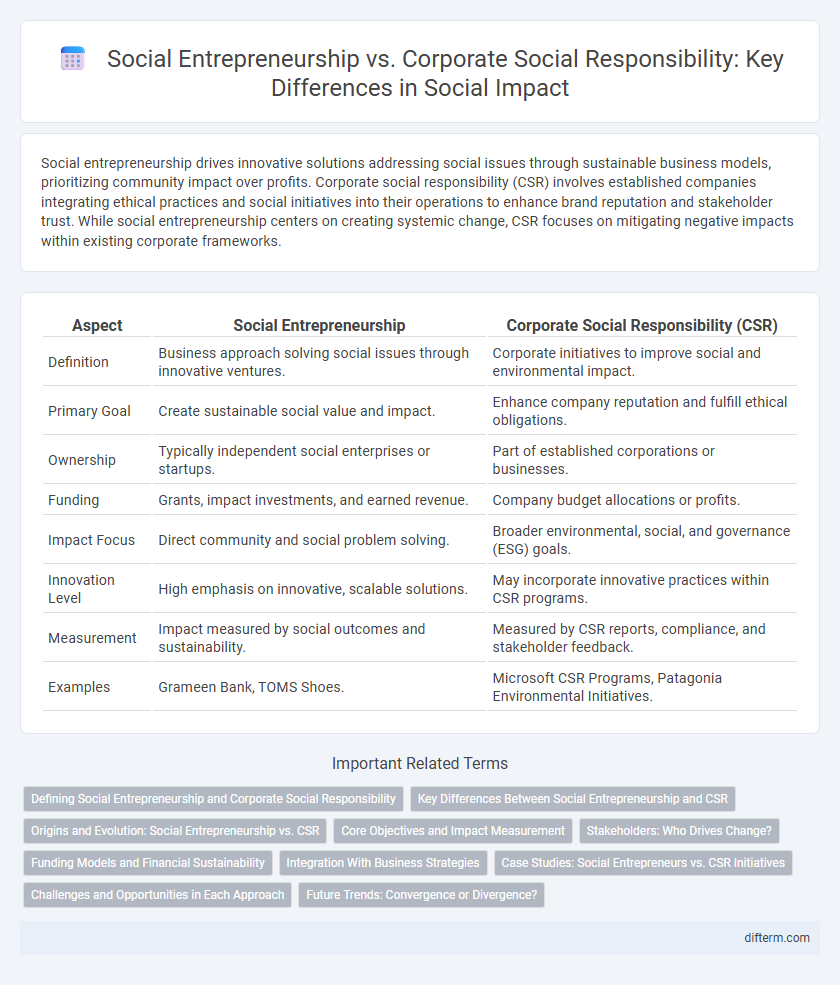Social entrepreneurship drives innovative solutions addressing social issues through sustainable business models, prioritizing community impact over profits. Corporate social responsibility (CSR) involves established companies integrating ethical practices and social initiatives into their operations to enhance brand reputation and stakeholder trust. While social entrepreneurship centers on creating systemic change, CSR focuses on mitigating negative impacts within existing corporate frameworks.
Table of Comparison
| Aspect | Social Entrepreneurship | Corporate Social Responsibility (CSR) |
|---|---|---|
| Definition | Business approach solving social issues through innovative ventures. | Corporate initiatives to improve social and environmental impact. |
| Primary Goal | Create sustainable social value and impact. | Enhance company reputation and fulfill ethical obligations. |
| Ownership | Typically independent social enterprises or startups. | Part of established corporations or businesses. |
| Funding | Grants, impact investments, and earned revenue. | Company budget allocations or profits. |
| Impact Focus | Direct community and social problem solving. | Broader environmental, social, and governance (ESG) goals. |
| Innovation Level | High emphasis on innovative, scalable solutions. | May incorporate innovative practices within CSR programs. |
| Measurement | Impact measured by social outcomes and sustainability. | Measured by CSR reports, compliance, and stakeholder feedback. |
| Examples | Grameen Bank, TOMS Shoes. | Microsoft CSR Programs, Patagonia Environmental Initiatives. |
Defining Social Entrepreneurship and Corporate Social Responsibility
Social entrepreneurship involves creating innovative solutions to address social, cultural, or environmental issues through mission-driven ventures that prioritize social impact over profit. Corporate social responsibility (CSR) refers to businesses integrating ethical practices and sustainable initiatives into their operations to benefit society while maintaining profitability. Both concepts aim to advance social good, but social entrepreneurship centers on new enterprise formation, whereas CSR focuses on responsible business conduct within existing organizations.
Key Differences Between Social Entrepreneurship and CSR
Social entrepreneurship involves creating innovative solutions to address social issues through sustainable business models, while corporate social responsibility (CSR) refers to established companies integrating ethical practices and community engagement into their existing operations. Social entrepreneurs take on direct risks and ownership of social impact initiatives, whereas CSR typically operates as a strategic department or program within a larger corporation, designed to enhance brand reputation and stakeholder relations. The primary distinction lies in social entrepreneurship's mission-driven approach to systemic change, compared to CSR's role in promoting corporate accountability and social contributions within profit-driven frameworks.
Origins and Evolution: Social Entrepreneurship vs. CSR
Social entrepreneurship originated in the 1980s as a grassroots movement aimed at solving social problems through innovative, market-based approaches, contrasting with corporate social responsibility (CSR), which emerged in the mid-20th century as a framework for businesses to integrate ethical practices and community concerns into their operations. Social entrepreneurship emphasizes creating scalable social impact by developing sustainable ventures, whereas CSR focuses on accountability and ethical obligations within existing corporate structures. Over time, both concepts have evolved, with social entrepreneurship driving systemic change and CSR expanding to include comprehensive sustainability and stakeholder engagement strategies.
Core Objectives and Impact Measurement
Social entrepreneurship centers on creating innovative solutions to address social problems through sustainable business models, prioritizing measurable social impact as the core objective. Corporate social responsibility emphasizes integrating ethical practices and community engagement within existing corporate frameworks, often measuring impact through compliance metrics and reputational outcomes. Social entrepreneurship drives systemic change by directly targeting social needs, while CSR initiatives support incremental improvements aligned with corporate goals.
Stakeholders: Who Drives Change?
Social entrepreneurship drives change through visionary founders and local communities actively engaged in problem-solving, prioritizing direct social impact over profit. Corporate social responsibility (CSR) initiatives are typically driven by company executives and shareholders aiming to align business practices with ethical standards and enhance corporate reputation. Stakeholders in social entrepreneurship often include beneficiaries and grassroots partners, while CSR emphasizes employee participation, investors, and regulatory bodies.
Funding Models and Financial Sustainability
Social entrepreneurship relies on diversified funding models including grants, impact investments, and earned income to ensure financial sustainability while driving social change. Corporate social responsibility (CSR) typically operates within a company's budget, funded by corporate profits and focused on initiatives aligned with business objectives. Social enterprises prioritize reinvestment of profits to scale impact, whereas CSR emphasizes philanthropy and compliance within financial constraints.
Integration With Business Strategies
Social entrepreneurship integrates social impact directly into core business models, driving innovation and sustainable value creation beyond profit. Corporate social responsibility (CSR) often operates as a peripheral function, enhancing reputation and compliance without fundamentally altering business strategies. Companies embracing social entrepreneurship align mission-driven objectives with strategic growth, fostering long-term societal and economic benefits.
Case Studies: Social Entrepreneurs vs. CSR Initiatives
Case studies reveal social entrepreneurs like Muhammad Yunus, founder of Grameen Bank, achieving systemic change by directly addressing poverty through microfinance innovations. CSR initiatives by corporations such as Patagonia emphasize environmental sustainability and community engagement but often operate within profit-driven frameworks. Social entrepreneurship drives transformative social impact by integrating innovation and mission, whereas CSR focuses on mitigating negative externalities within existing business models.
Challenges and Opportunities in Each Approach
Social entrepreneurship faces challenges such as limited access to capital and scalability issues but offers opportunities for innovative, community-driven solutions that directly address social problems. Corporate social responsibility (CSR) encounters challenges including potential greenwashing and misalignment with core business objectives, while its opportunities lie in leveraging extensive resources and brand influence to drive widespread social impact. Both approaches require strategic commitment and transparent impact measurement to optimize social value creation.
Future Trends: Convergence or Divergence?
Social entrepreneurship emphasizes innovative, scalable solutions to social problems driven by mission over profit, while corporate social responsibility integrates social and environmental concerns within traditional business models. Future trends suggest a convergence as corporations increasingly adopt entrepreneurial mindsets to address social issues more dynamically, yet divergence persists due to differing motivations and operational frameworks. Technological advancements and heightened stakeholder expectations will likely blur boundaries, fostering hybrid models that combine impact-driven innovation with corporate resources.
social entrepreneurship vs corporate social responsibility Infographic

 difterm.com
difterm.com